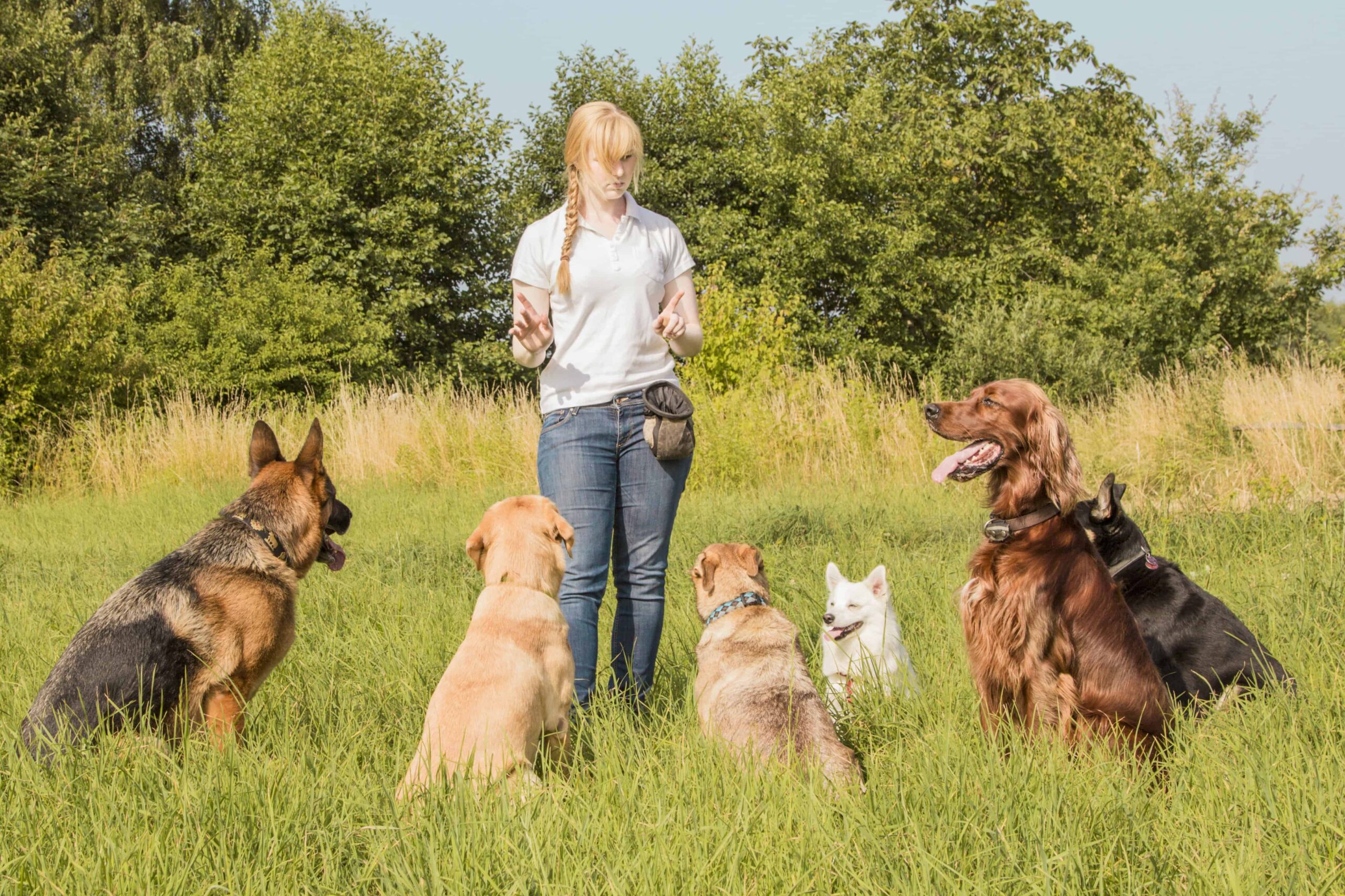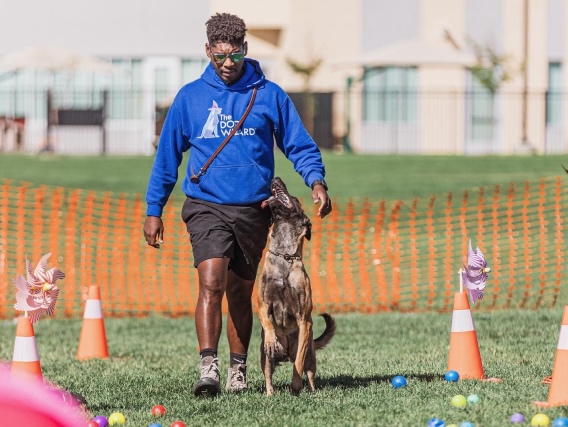The Ultimate Overview to Dog Training Charlotte: Strategies for Success
The Ultimate Overview to Dog Training Charlotte: Strategies for Success
Blog Article
Unlock Your Canine's Potential: Proven Canine Training Techniques for Success
Reliable canine training is a nuanced procedure that hinges on understanding canine habits and employing medically backed methods. By incorporating favorable reinforcement, developing clear commands, and prioritizing socializing, pet owners can grow an efficient partnership with their family pets.
Understanding Pet Dog Behavior
Comprehending canine actions is vital for effective training and promoting a favorable relationship in between dogs and their proprietors. A comprehensive grasp of canine body movement, vocalizations, and social interactions is crucial for acknowledging their feelings and needs. Canines connect primarily with non-verbal signs; for instance, a wagging tail may show exhilaration, while pinned ears can signal concern or entry.

Moreover, ecological variables play a substantial function in shaping a dog's actions. Adjustments in regular, new surroundings, or the visibility of strange individuals can result in anxiety or stress and anxiety in canines. Recognizing these triggers makes it possible for proprietors to alleviate unfavorable responses and create suitable training strategies.
Ultimately, a deep understanding of pet dog actions lays the structure for successful training methods, boosting both behavior and the total bond in between the pet and its proprietor. dog training charlotte nc. This understanding is important for fostering a well-adjusted, satisfied canine companion
Favorable Reinforcement Strategies
Effective training counts heavily on favorable reinforcement strategies, which have been revealed to yield substantial lead to shaping preferred behaviors in pet dogs. This method entails rewarding a pet for exhibiting details behaviors, consequently boosting the possibility that these actions will be repeated. Incentives can take various kinds, including treats, appreciation, playthings, or playtime, depending upon what encourages the individual pet dog.

It is vital to gradually terminate incentives as the canine learns the actions, transitioning to periodic reinforcement. This method preserves the actions gradually while stopping dependency on consistent incentives. By focusing on positive reinforcement, instructors can grow a relying on connection with their pets, advertising a healthy and participating training environment that boosts overall obedience and performance.
Establishing Regular Commands
A fundamental aspect of successful canine training is the establishment of consistent commands. Uniformity in commands is critical for reliable communication between the pet and the instructor. When commands are consistent, canines find out to associate certain words with preferred behaviors, which increases the training procedure and boosts understanding.
To develop consistent commands, it is necessary that all household participants utilize the same terminology and motions. If one individual utilizes "sit" while another says "rest down," it can develop confusion for the pet. Select clear, distinctive words for commands and make sure every person associated with the pet dog's training sticks to these selections.
Additionally, rep is essential. Reinforce commands via constant method, making certain that the pet obtains ample opportunities to respond properly. When a pet successfully follows a command, prompt positive reinforcement should comply with. This might be in the type of treats, praise, or playtime, solidifying the connection between the command click here to read and the action.
Finally, hold your horses. Developing constant commands takes time and effort. With devotion and quality, you will help your pet create a solid understanding of assumptions, inevitably resulting in a well-behaved buddy.
Socialization and Direct Exposure
Interacting socially a pet dog is essential for fostering a well-adjusted and positive companion. This process includes subjecting your pet to a range of atmospheres, individuals, and various other pets to establish their social skills and flexibility. Early socializing, preferably between the ages of three to fourteen weeks, is crucial, as it prepares for a pet dog's future actions.
Throughout socializing, purpose to give favorable experiences in various setups, such as parks, busy streets, and homes with other family pets. Present your pet to various stimulations, including sounds, sights, and smells, making sure that each experience is satisfying. This exposure aids reduce concern and anxiety, paving the means for a more resistant dog.
Participating in controlled team play sessions with various other canines can additionally improve social skills, teaching your family pet ideal interactions and limits. Constantly monitor your pet dog's convenience level during these experiences, slowly raising exposure as their confidence expands. Bear in mind, the goal is to create a well-rounded family pet that grows in diverse situations, promoting a harmonious partnership with both human beings and various other animals. Prioritizing socialization will dramatically add to your pet go dog's general joy and actions throughout their life.
Overcoming Common Educating Obstacles

Pet dogs might struggle to focus in hectic or strange settings. Slowly desensitize your pet to distractions by starting training in a peaceful atmosphere and gradually presenting even more stimulations as they become skilled.
Furthermore, behavior concerns like leaping or excessive barking can become discouraging. Address these by showing different actions, such as resting steadly when welcoming visitors. Uniformity and patience are essential; reinforce preferred habits constantly and prevent scolding, which can cause confusion.
Finally, acknowledge that each canine is distinct, and training timelines may vary. Dressmaker your strategy to your pet dog's private requirements, and seek professional guidance if necessary. With perseverance and the right strategies, overcoming these obstacles can bring about a trained, happy canine companion.
Verdict
Finally, opening a dog's prospective demands a comprehensive method that includes an understanding of canine actions, the application of positive support methods, and the establishment of consistent commands. Early socialization and direct exposure to diverse environments additionally enhance a canine's adaptability and self-confidence. By resolving usual training difficulties with tailored approaches and perseverance, a participating and harmonious partnership between dog and trainer can be promoted, inevitably leading to a well-behaved buddy capable of growing in numerous circumstances.
Effective pet training is a nuanced process puppy wont stop barking that pivots on understanding canine actions and employing medically backed techniques.Recognizing dog habits is vital for reliable training and fostering a positive connection in between canines and their proprietors.Effective training depends greatly on positive reinforcement strategies, which have been shown to generate significant results in forming desired actions in dogs. When commands are uniform, pet dogs find out to associate certain words with wanted behaviors, which speeds up the training procedure and boosts understanding.
In conclusion, unlocking a pet dog's possible necessitates a thorough approach that incorporates an understanding of canine habits, the application of favorable support strategies, and the establishment of consistent commands.
Report this page